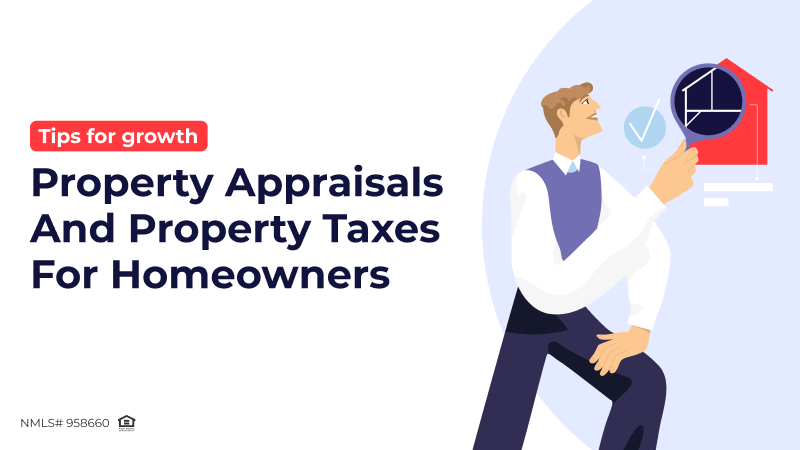Understanding property appraisals and taxes is essential for anyone involved in real estate transactions, including homeowners and brokers. Property appraisals determine a home’s market value, which affects mortgage terms, selling prices, and refinancing opportunities. Similarly, property taxes, calculated from these valuations, significantly influence a homeowner’s financial obligations. Grasping these concepts ensures that homeowners can manage their assets wisely and brokers can effectively guide their clients. This article aims to explain what property appraisal is and how this process impacts property ownership and transactions.
Property Appraisals Explained
Looking for a suitable loan program?
Choose among 20+ programs and get
a detailed loan calculation
Loan Calculator
Programs
So, what is a property appraisal? It is a professional assessment of a property’s market value conducted by a certified appraiser. This valuation is crucial in real estate as it influences numerous financial decisions. When buying a home, lenders require appraisals to ensure the property is worth the loan amount. For sellers, an appraisal provides a benchmark for pricing their property competitively. Homeowners who want to refinance their mortgage also need an appraisal to obtain good loan conditions based on the property’s current value.
Appraisers consider several key factors when evaluating a property.
- Location is paramount. Properties in desirable areas or with advantageous geographical features typically hold higher values.
- The size of the property, including usable space and land, directly affects its appraisal value.
- Condition is another critical factor. Homes that are well-maintained or recently updated generally receive higher valuations.
- Lastly, market trends play a significant role. Appraisers analyze recent sales of comparable properties, or “comps,” in the same neighborhood to gauge the property’s market standing.
The Property Appraisal Process
The property appraisal process is a critical step in real estate transactions. It proves that all parties understand property’s market value. This process typically follows several key steps, from initiation to the final appraisal report.
Step 1. Ordering the Appraisal
The appraisal process usually begins when a lender, homeowner, or potential buyer requests an evaluation of a property’s value. This request is often prompted by the need for a mortgage loan, refinancing, or a property sale.
Step 2. Conducting the Appraisal
Once commissioned, the appraiser starts gathering essential data for a fair valuation. This includes a physical inspection of the property to assess its condition, size, and any unique features or improvements. Appraisers also evaluate the location’s desirability, local market conditions, and any external factors that could influence the property’s value.
Step 3. Using Comparative Market Analysis
A significant tool in the appraisal process is the comparative market analysis (CMA). Appraisers look at comparable properties (“comps”) that have recently sold in the same area. This comparison helps to establish a baseline for valuing the subject property. The selected comps are similar in terms of location, size, condition, and features. It provides a relevant market context for the appraisal.
Types of Appraisals
There are different types of property appraisals, each varying in depth and scope.
The most comprehensive is the full appraisal, which includes a detailed inspection of the interior and exterior of the property. Less extensive options include the desktop appraisal and the drive-by appraisal. A desktop appraisal is done remotely without a physical visit, relying instead on public records and existing property data. The drive-by appraisal involves an exterior examination of the property from the street, which provides a quicker but less detailed valuation.
Challenges with Property Appraisals
Property appraisals, while crucial for real estate transactions, can sometimes present challenges that may complicate the buying, selling, or refinancing of homes. Knowing how to solve these issues is vital for homeowners and potential buyers.
Appraisals Coming in Too Low
One of the most common problems in property appraisals is a valuation that falls below the expected amount, particularly in a rapidly ascending market or when the agreed selling price is higher than recent comps suggest. This can occur due to a variety of reasons, such as an appraiser’s unfamiliarity with the local market or the use of outdated comps. A low appraisal can hinder financing arrangements, as lenders typically offer loans based on the appraised value, not the sale price.
Renegotiation Following Low Appraisals
If an appraisal comes in lower than the sale price in a real estate deal, it often leads to renegotiation of the price. Buyers may leverage the lower appraisal to negotiate a reduction in the sale price.
Conversely, sellers can contest the appraisal if they believe it undervalues the property, especially if there are strong indicators. These can be recent upgrades or unique features of the property that were possibly overlooked.
Appealing the Appraisal
Homeowners have options if they believe an appraisal is incorrect or does not accurately reflect their home’s market value. One can appeal the appraisal by providing additional information, such as more recent or more relevant comps, evidence of errors in the report, or details of recent home improvements that may not have been considered. This appeal is reviewed by either the appraiser or a third party, depending on the specific circumstances.
Overview of Property Taxes
Struggling with a loan scenario?
Get a solution in 30 minutes!
Fill out the short form and get your personal offer
Submit a Scenario
Property taxes are essential, recurring charges that homeowners must pay, based largely on the assessed value of their property. These taxes fund crucial local services such as public schools, emergency services, and local infrastructure projects.
Property Tax Calculations
The amount of property tax owed is determined by two main factors: the assessed value of the property and the mill rate.
The assessed value is an estimate of the property’s worth. It is typically decided by a local government assessor. This value may not necessarily match the market value but is meant to be a fair representation of the property’s worth.
The mill rate is the amount of tax payable per dollar of the assessed value of a property. It is expressed in mills, where one mill represents one-tenth of a cent. This rate is set by local governments and can vary between different areas depending on local funding needs.
Factors Influencing Property Taxes
Several factors can affect the amount of property tax. Location plays a crucial role; properties in areas with higher property values or greater public funding needs might face higher taxes. Changes in the property itself, such as improvements or additions, can increase the assessed value, thereby increasing the tax liability.
Homeowners should understand how these taxes are calculated and what influences their bills to better manage their finances and participate in local governance.
Impact of Property Appraisals on Property Taxes
Property appraisals significantly influence property tax assessments, directly affecting how much homeowners are required to pay each year.
Appraised Value and Property Tax Assessments
The appraised value of a home, determined by a professional appraiser, is a key component in calculating property taxes. This value estimates the current market worth of a property. Local tax authorities use this appraisal to set the assessed value, which is a percentage of the appraised value. This assessed value is multiplied by the local mill rate to determine the amount of property tax owed. Consequently, a higher appraised value typically leads to higher property taxes, whereas a lower appraised value reduces the tax burden.
Appealing Property Tax Assessments
Homeowners have the opportunity to appeal their property tax assessments if they believe the appraisal does not accurately reflect their home’s market value. This could be due to various factors, such as usage of incorrect data during the appraisal, changes in the property condition, or shifts in the local real estate market. The appeal process involves submitting evidence to contest the appraisal, such as recent comparable home sales or an independent appraisal, to the local tax review board.
By participating in the appraisal and assessment process, homeowners can ensure their property taxes are fair and reflect the true value of their home.
Practical Tips for Homeowners
Preparing effectively for a home appraisal and knowing how to manage or appeal property taxes are crucial skills for homeowners. Here are some strategies that can help.
Preparing for a Home Appraisal
To secure the best possible outcome from a home appraisal, ensure your property presents well. Start by making necessary repairs, such as fixing leaky faucets or replacing broken windows. Enhance curb appeal with simple landscaping and a tidy exterior. Inside, declutter and deep clean to make the space inviting. Additionally, compile a list of any recent upgrades or improvements that could increase the home’s value, and present this to the appraiser.
Managing and Appealing Property Taxes
If you believe your property’s assessed value is too high, leading to unfair tax calculations, consider appealing the assessment. Begin by reviewing the assessment letter from your local tax authority to understand their valuation. Gather evidence such as recent appraisals or the selling prices of comparable homes in your area that justify a lower valuation. Submit this documentation according to the guidelines provided by your local tax authority, usually during a specific appeal period each year.
By proactively managing these aspects, homeowners can not only ensure a fair appraisal of their property but also potentially reduce their tax liabilities, leading to significant savings over time.
Conclusion
Looking for a suitable loan program?
Choose among 20+ programs and get
a detailed loan calculation
Loan Calculator
Programs
Whether you are buying, selling, or simply managing your property’s value, an in-depth understanding of property appraisals and taxes is crucial. Property appraisal determines the market value of a home, influencing major financial decisions such as selling, buying, and refinancing. Similarly, the resulting appraisal impacts how property taxes are calculated, affecting homeowners’ annual financial responsibilities.
For issues that require deeper insight, consulting with real estate professionals, such as certified appraisers, tax advisors, or real estate brokers, is highly advisable. And if you’re a broker, be sure to leverage your knowledge with a trusted mortgage lender, like A&D Mortgage.



